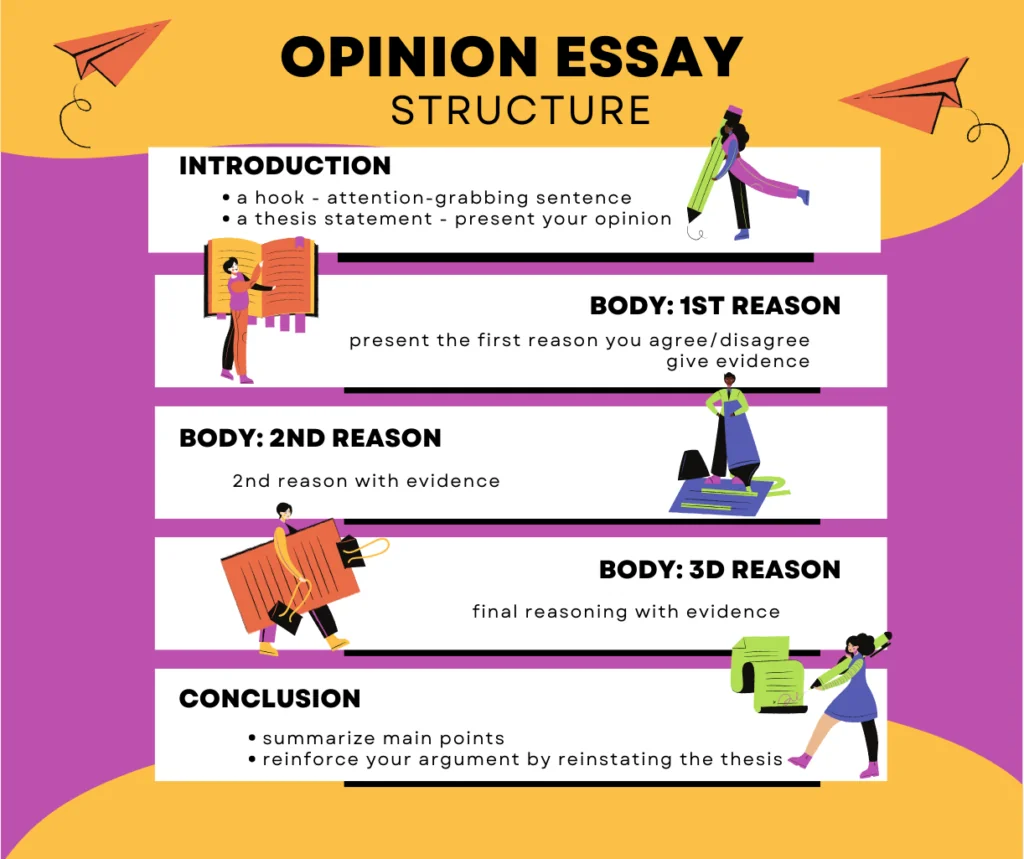Sometimes you can be asked questions like “Is technology needed for human development?”, “Do you feel students need to wear uniforms?”, or maybe something along the lines of “Do you agree that the music industry has become largely toxic?” All these questions can be answered on paper through an opinion essay. Students and writers widely use this type of writing to express their own views on the specifically stated topic. If you are looking for ways to do the same, well then, you’ve come to the right place! Below we will give all the necessary details to help you structure and craft your opinion essay both with quality and ease.

✅ AI Essay Writer ✅ AI Detector ✅ Plagchecker ✅ Paraphraser
✅ Summarizer ✅ Citation Generator
What Is an Opinion Essay: Key Characteristics and Structure
An opinion essay is a type of writing where you share your viewpoint on a particular topic. Unlike other essays that require multiple perspectives or even facts, opinion writing focuses on what you think and why. Your goal is to convince the reader to agree with your outlook (or at least to consider it closely) by presenting strong arguments and supporting them with examples.
In an opinion essay, you express a clearly formed opinion backed by research, logic, and sometimes anecdotal evidence. It’s your chance to articulate a position and demonstrate both what you think and why you think it. Being able to express an opinion effectively is an important skill, especially in today’s world where opinions are everywhere, like on social media. It also allows you to identify opinions that are well-supported versus those that aren’t. You’ll often find opinion essays in the Op-Ed sections of newspapers, where writers share their views on various topics. These essays can influence public beliefs and spark important discussions.

The structure of an opinion essay typically follows the five-paragraph format. Start with an introduction that includes a hook to grab the reader’s attention and a thesis statement that clearly presents your opinion. In the body, each paragraph should cover a separate reason supporting your thesis, backed up with evidence or examples. Finally, the conclusion summarizes your main points and restates your thesis in a fresh way to reinforce your argument. This structure helps keep your essay organized and your arguments clear, making it easier for your readers to follow and be persuaded by your point of view.
What All Opinion Essays Need to Include
All opinion essays, regardless of the topic, share some key characteristics that make them effective and persuasive. First and foremost, your essay must have a clear opinion or thesis. This is the main point you want to make and it should be evident right from the start. Whether you formed your opinion quickly or have been considering it for a while, it has to have a clear start to guide the reader through your argument.
Novelty is another important aspect. A strong opinion essay brings something new to the table. This could mean presenting a viewpoint that challenges mainstream ideas or supporting a widely held belief with fresh, interesting research. Adding a unique perspective or new information keeps your essay engaging and relevant.
You should choose a semiformal tone for your writing. While it’s easy to slip into a conversational style, especially when discussing personal opinions, keeping a balanced, semiformal tone lends your writing more credibility. Using such a writing style you can be sure that your essay is taken seriously yet doesn’t sound too stiff or too casual. You can be sure that your text sounds perfect by using our essay editing services.
Aside from that, avoid ambiguity. Your opinion should be clear and well-defined (from the beginning to the very end). If you aren’t sure about your stance, your reader won’t be either. Make it clear to yourself what you think and why you think it before you start writing. This clarity will help you stay focused and avoid rambling.
Finally, support your opinion with strong evidence and clear reasoning. Simply stating “I think” isn’t enough. You need to back up your viewpoint with facts, examples, and logical arguments. This strengthens your case and shows that your perspective is well-considered and credible.

How to Write Opinion Essay
We have finally moved to the main part of our guide – writing an opinion essay. Before sitting down and typing out your thoughts, you need to do some preparation.
Start with brainstorming. If you don’t have a specific question you need to answer or a prompt, think about all the topics you are passionate about and your possible response. Suppose you are given a prompt about the benefits of video games in education, consider both the positive and negative aspects before forming your opinion. Now, as we move that out of the way, we can begin structuring our document.
Next, move on to research. This is where you form your opinion by gathering data and asking yourself why you believe what you do. Look for supporting evidence from reliable sources, such as academic articles, books, and credible websites. For example, if you believe video games enhance learning, find studies or expert opinions that back this claim. Don’t forget to explore counterarguments to present a balanced view and strengthen your essay.
Now, to the writing part.
- Create an outline. Follow the five-paragraph essay structure, but adjust the number of paragraphs as needed. An outline helps organize your thoughts and ensures each paragraph logically follows the next.
- Begin drafting. Write a rough draft without worrying about perfection. Include all your research and quotes, citing sources as you go.
For instance, if you’re arguing that homework should be banned, include quotes from studies showing its negative impact on student health. - Review and revise. Read your essay out loud to check for logical flow. All evidence must support your thesis and your opinion should stay clear throughout. You can reorganize paragraphs to improve clarity if your essay feels a bit disjointed.
- Proofread your essay. Look for grammatical errors, spelling mistakes, and punctuation issues. Use tools like AcademicHelp Grammar Checker or ask someone else to review your work. A well-proofread essay is polished and professional, making a stronger impact on your readers.
How to Start Off an Opinion Essay: Examples of Great Introductions
As was mentioned above, an introduction is an important and inseparable part of an opinion piece. It needs to be attention-grabbing yet clearly state the topic and key thesis. As such, the structure of an introduction is a hook, a clear presentation of the topic, and a thesis statement that outlines your opinion. Here are some effective strategies and examples of how you can start your opinion essay.
Use a Surprising Statistic. A startling fact can immediately draw your reader in and set the stage for your argument.

Give an Unpopular Opinion. Stating a controversial or unconventional viewpoint can pique curiosity and invite readers to consider a different perspective.

Ask a Rhetorical Question. Engaging your audience with a thought-provoking question can stimulate interest and reflection

Share a Life Experience/Anecdote. A brief, personal story can make your essay relatable and memorable

Incorporating these elements, you can craft a strong introduction that sets the tone for the rest of your essay and makes your readers eager to read more.
Conclusion
You may think that opinion essays are easy. After all, all you have to do there is state your point of view. Yet, it is important to do it properly. You need to present compelling evidence and present relevant and logical arguments as to why you think that way. That’s why structure is so important for the writing process. It will allow you to build a rational narrative, that will be clear and easy to follow for your readers. After all the main point of writing such an essay is to make others consider your perspective and maybe even make them change their mind.
FAQ
Follow us on Reddit for more insights and updates.





Comments (0)
Welcome to A*Help comments!
We’re all about debate and discussion at A*Help.
We value the diverse opinions of users, so you may find points of view that you don’t agree with. And that’s cool. However, there are certain things we’re not OK with: attempts to manipulate our data in any way, for example, or the posting of discriminative, offensive, hateful, or disparaging material.